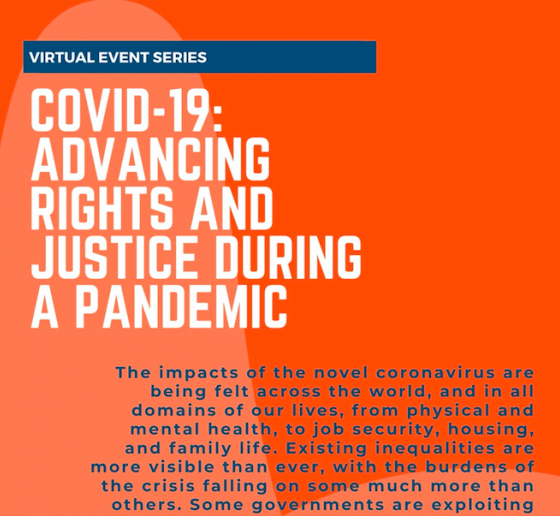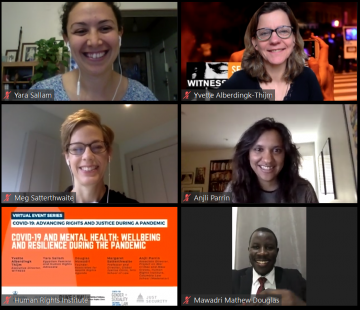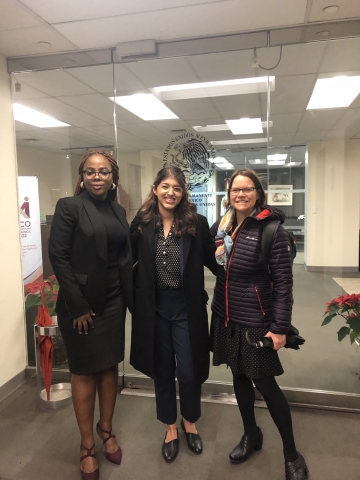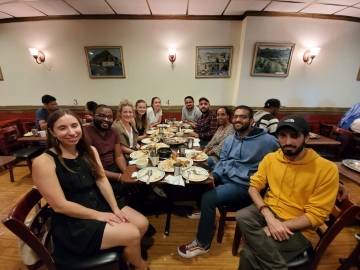From the Human Rights Institute: Responding to the Impacts of COVID-19
Maya Alkateb-Chami, managing director of the Human Rights Institute, and Sarah Knuckey, Lieff Cabraser Clinical Professor of Law and director of the Human Rights Clinic and Human Rights Institute, delve into the institute’s initiatives to respond to COVID-19, including their virtual event series held throughout the spring.

The impacts of the novel coronavirus are being felt across the world and in all domains of our lives, from physical and mental health, to job security, housing, and family life. Existing inequalities are more visible than ever, with the burdens of the crisis falling on some much more than others. In this context, many governments are exploiting the crisis to crack down on civil liberties. As the Columbia Law School Human Rights Institute (HRI) joined colleagues around the world in adjusting to physical distancing, working virtually, and supporting students and advocacy partners remotely, it has continued our rigorous work to advance human rights and have expanded it to respond to the pandemic.
This spring, HRI launched a virtual event series to create a global platform for discussing the rights and justice impacts of the pandemic and how advocates can respond. Team members are working to strengthen the United Nations human rights treaty bodies in the context of the pandemic. As fair trials come under increased threat, HRI is training monitors to expand our monitoring of trials globally. And the institute’s advocacy to further equality and socioeconomic rights in the United States and in the context of the war in Yemen has increased to respond to new threats from COVID-19.
On behalf of HRI, we are incredibly inspired by social movement activists and our colleagues and partners in the human rights field who are fighting both to uphold past wins to advance human rights and to gain new ground. We are also energized by our students, who are adapting to new ways of learning, building community, and advocating for change. Finally, we are grateful to our team members—some of whom have young children, are separated from family, or had to move—for their resilience, care for each other, and work for social justice.
New Series on Rights and Justice During and After COVID-19
In March, Knuckey and the institute joined other partners to organize an event series bringing together scholars and practitioners to discuss the threats human rights face because of the coronavirus pandemic and how advocates might respond. The series is advancing critical conversations about the human rights impact of the COVID-19 crisis, has created a platform for exploring and sharing how activists are responding, and is being used as an educational resource in university classrooms across the United States.
“The series is tackling a wide array of difficult issues and has been joined by thousands of participants from around the world,” says Knuckey. “The goal is to bring together leading thinkers and activists to share expertise and innovative advocacy strategies.”
Events focus on the rights of particular groups, such as refugees and people with disabilities, and cover an array of rights, including digital, reproductive, health, education, housing, and water rights. Events also examine how governments are responding to the crisis, such as through the use of emergency powers, and the impacts of the pandemic on the wellbeing of advocates.
Speakers included grassroots activists such as Catherine Flowers (Center for Rural Enterprise and Environmental Justice) and Hassan Jabareen (Adalah Legal Center); international NGO advocates like Yaqui Wang (Human Rights Watch) and Charanya Krishnaswami (Amnesty International USA); UN experts such as Special Rapporteurs Fionnuala Ni Aolain (on counterterrorism) and Leilani Farha (on housing); and leading academics, such as Amna Akbar (Ohio State), Kathryn Sikkink (Harvard), and César Rodríguez Garavito (NYU). The series, which was co-organized with Duke Law’s International Human Rights Clinic, Columbia Law’s Center for Gender and Sexuality Law, and Just Security, has featured speakers and perspectives from many countries, including Australia, Colombia, Costa Rica, Egypt, Italy, Nigeria, Somalia, and Uganda.
In addition to co-curating the series, Columbia Law School faculty and staff have moderated many of its events, with Knuckey introducing the entire series; James L. Dohr Professor of Law Katherine Franke moderating an event on reproductive rights; Anjli Parrin, associate director, Project on War Crimes and Mass Graves, moderating a panel on mental health during the pandemic; Clinical Teaching Fellow Gulika Reddy moderating an event on responsibility, hope, and strategy in crisis; JoAnn Kamuf Ward, director of the Human Rights in the U.S. Project, moderating a discussion on innovative legal approaches for advocacy during the pandemic; Alkateb-Chami moderating a forthcoming event on the right to education; Elizabeth F. Emens, Isidor and Seville Sulzbacher Professor of Law, moderating a panel on the rights of persons with disabilities; and Priyanka Motaparthy, director of the Project on Counterterrorism, Armed Conflict and Human Rights, moderating a panel on COVID-19 in conflict.
Strengthening the UN Human Rights Treaty Body System
Louis B. Henkin Professor of Human and Constitutional Rights Sarah Cleveland is working with members of the UN human rights system to explore how the UN human rights treaty bodies, which monitor the implementation of the core international human rights treaties, can ensure the protection of rightsholders in the context of the COVID-19 pandemic.
“The pandemic is widening the human rights protection gap,” says Cleveland. “The world that emerges risks being more unequal, more authoritarian, poorer. And with international, regional, and national rule-of-law institutions weakened, so there will be even greater need for the treaty bodies to protect human rights. At the same time, COVID-19 is making the work of the treaty bodies more difficult.”
This has been occurring during a UN General Assembly review of the work of the treaty bodies this year. Building on ongoing work to strengthen the treaty body system, Cleveland is helping to consider how the pandemic may change the environment for the human rights treaty bodies in fundamental ways, as well as to explore opportunities for different, creative, and more efficient work within resource and convening constraints.
Furthering Equality and Socioeconomic Rights in the United States
“COVID-19 has laid bare the inequalities long present in the United States,” says JoAnn Kamuf Ward, who directs HRI’s Human Rights in the U.S. Project. “The institute and the Human Rights Clinic are partnering with advocates across the country to highlight long-standing structural challenges and to ensure that the responses to this health pandemic—and the policies that emerge during and after the crisis—are grounded in human rights principles.”
In a submission to the U.S. government, HRI called on federal actors to shift course and take a leadership role in protecting the historically marginalized communities that are bearing the brunt of the health impacts and economic harm immediately. We also submitted a comprehensive public comment to the State Department, highlighting how the U.S. failure to protect economic and social rights domestically has paved the way for the disparate impacts of coronavirus on communities of color.
HRI co-organized and participated in a briefing of 44 governments to highlight the ways that ongoing lack of access to water and sanitation exacerbate the impacts of COVID-19 in rural U.S. communities. In the United States, 1.4 million people lack complete plumbing, making them unable to properly dispose of human waste. For exponentially more, safe drinking water is out of reach. This is a significant barrier to preventing the spread of COVID-19 and other illnesses. In order to catalyze immediate policy solutions, we have joined national advocacy movements to fight for novel coronavirus stimulus packages that ensure water access for all—regardless of race, ethnicity, or socioeconomic status.
Monitoring and Promoting Fair Trials During the Pandemic
The TrialWatch Project, a partnership between HRI and the Clooney Foundation for Justice, monitors and responds to trials around the world that pose a high risk of human rights violations.
“Some governments have already taken advantage of the COVID-19 crisis to crack down on human rights—for example, criminalizing speech related to the pandemic and instituting sweeping emergency powers that limit human rights activities and political participation,” explains HRI’s TrialWatch Legal Fellow Sarah Mehta.
Anticipating a wave of criminal prosecutions against journalists and human rights activists as a result of some of these new restrictive measures, the TrialWatch team is growing the network of local trial monitors by expanding online training programs and running a series of remote trainings for different regions and human rights issues. With the Clooney Foundation for Justice and local partners around the world, we are preparing for activists, students, and journalists to be ready to monitor trials, including those related to COVID-19 restrictions, as courts reopen.
Reporting and Advocacy to Promote Socioeconomic Rights in Yemen
In partnership with the leading Yemeni human rights organization Mwatana for Human Rights, the Human Rights Clinic is examining the effect of the armed conflict in Yemen on the rights to health, water, sanitation, and food—all rights that the government of Yemen and its allies must protect in order to fight back against the pandemic. After more than five years of war, Yemen’s health care system has been decimated by attacks on hospitals and medical personnel. Parties to the conflict have impeded or blocked humanitarian assistance, and a blockade of Yemen’s seaports, as well as closure of key airports, has also worsened the humanitarian situation.
“As part of our commitment to working towards accountability for abuses in the Yemen war, we’ve focused on issues that affect peoples’ daily lives,” says Priyanka Motaparthy, director of HRI’s Project on Armed Conflict, Counterterrorism, and Human Rights. “Students’ advocacy on the rights to health, clean water, and unimpeded humanitarian access in Yemen comes at a moment when COVID-19 has made failure to protect these rights more dangerous than ever.”
The clinic is working with Mwatana to prepare a submission to the UN Committee on Economic, Social, and Cultural Rights to highlight how the actions of the Yemeni government and its allies in the Saudi and Emirati-led Coalition have deprived Yemenis of clean water, health care, and humanitarian aid, including medical supplies—essential rights at all times and with heightened importance during the global pandemic.
About the Human Rights Institute and Human Rights Clinic
The Human Rights Institute advances international human rights through education, advocacy, fact-finding, research, scholarship, and critical reflection. The Columbia Law School Human Rights Clinic works to advance human rights through partnerships with civil society organizations and communities. Learn more online, and follow us on Twitter: @CLSHumanRights and @columbialaw.


